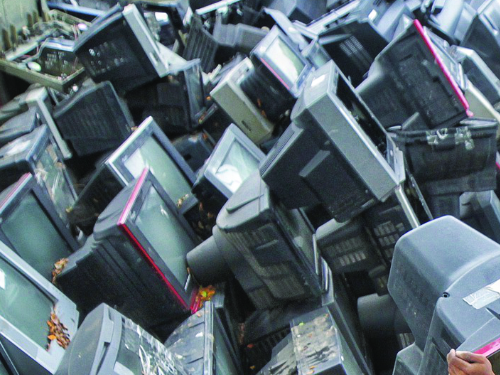
Below is a Council Motion moved by Bristol Liberal Democrats on improving recycling practices for electronic waste that has been adapted into a template for you to use in your Council area:
Full Council Notes:
- The current global efforts for developed economies to decarbonise is leading to increased electrification and digitisation within those economies.
- A consequence of this is the growth in the production of electronic devices, many of which eventually become Electronic Waste.
- This type of waste poses a more significant challenge in terms of recycling compared to simpler materials such as plastic and metal recycling. This is due to the presence of potentially harmful substances within Electronic Waste, many of which are from Rare Earth Elements (REEs).
- Extracting and refining REEs as well as the challenge of addressing Electronic Waste presents logistical problems for national and local governments globally. There are also significant carbon costs associated with these.
- The development of a Circular Economy, where waste is minimised and in some where possible completely eliminated, necessitates bold advances both in REE and Electronic Waste recycling.
- REE recycling in particular is in its infancy globally and significant advances need to be made in order to keep pace with the electrification and digitisation of the global economy.
- Market manipulation practices in the REE market by the government of the People’s Republic of China (PRC), including price hiking, is a source of strategic concern internationally. The PRC Government is able to do this due to years of investment in REE mining development and acquiring REE mining rights on an unprecedented scale internationally.
Full Council Believes:
- [COUNCIL NAME] has a demonstrated environmental ethos, has a responsibility to do its part to tackle the growing problems of Electronic Waste and the wastage of REE.
- That efforts need to be made to reduce the carbon cost of producing more electronic devices with utilise REEs. Ultimately REEs recycling processes will need to be researched, developed, and tested to stop this exacerbating the Climate Emergency.
- Electronic Waste, and that related to REEs, needs to be dealt with in a way that is environmentally sustainable and keeps those individuals processing such waste safe from harm.
- [AREA NAME], and the whole country, have a moral responsibility in terms of environmental justice to increase the capacity for Electronic Waste and REE related waste to be processed domestically. This should be done with a particular view to ultimately putting an end to the environmental injustice of sending such waste to be processed in questionable conditions abroad, including in developing countries.
- Mutual support and aid groups that promote the sharing and donating of Electronic Devices are an unacknowledged source of community support. Their efforts during recent lockdowns have helped keep many [AREA NAME] citizens, educated, connected and supported.
- Enforcement of the “Right to Repair” in principle is ultimately beneficial to: consumers, the environment, the wider community, and the economy (local and national), as well as promoting innovation.
- The UK Government’s current goal to ban the sale of petroleum fuelled vehicles by 2030 will likely lead to an increase in electric vehicle purchases. Because of this REE use and wastage is likely to increase exponentially as this deadline gets closer.
Full Council Resolves that:
The Mayor and Council Leadership should:
- Engage with [INSERT LOCAL RECYCLING COMPANIES], our local Universities, and other relevant bodies with a view to establishing electronic waste recycling services that will be able to recycle certain REEs from electronic devices and electric vehicles in a way which is safe to refuse workers and the environment and allows for the expansion of the range of electronic devices eligible for recycling on the BCC list for “small electrical items recycling”.
- Explore best practice, and monitor ongoing research and technological advances in the area, including the University of Birmingham’s developing SUSMAGPRO (Sustainable Recovery, Reprocessing and Reuse of Rare-Earth Magnets in a Circular Economy) project with regard to the above efforts. More advanced programmes and systems for REE recycling in other countries including but not exclusively those in the Asia-Pacific region should be carefully researched.
- Establish a reporting mechanism to allow for regular updates on the above actions to be made to Council through the relevant Scrutiny bodies.
- Lobby the UK Government, in co-operation with other concerned local authorities, to enhance the “Right to Repair” law passed 8th July 2021. This should be expanded to specifically include laptops and Smart Phones in particular within its remit, and to make repair services and resources more affordable and accessible. The law should also enhance end-user “Right to Repair” and provide protection from “planned obsolescence” in electronic devices.
COUNCIL NAME should:
- Help to promote, publicise (including via the Council website, social media feeds and written communications to residents such as waste collection packs), and encourage community mutual aid schemes that help recycle electronic devices between users and including those on low incomes.